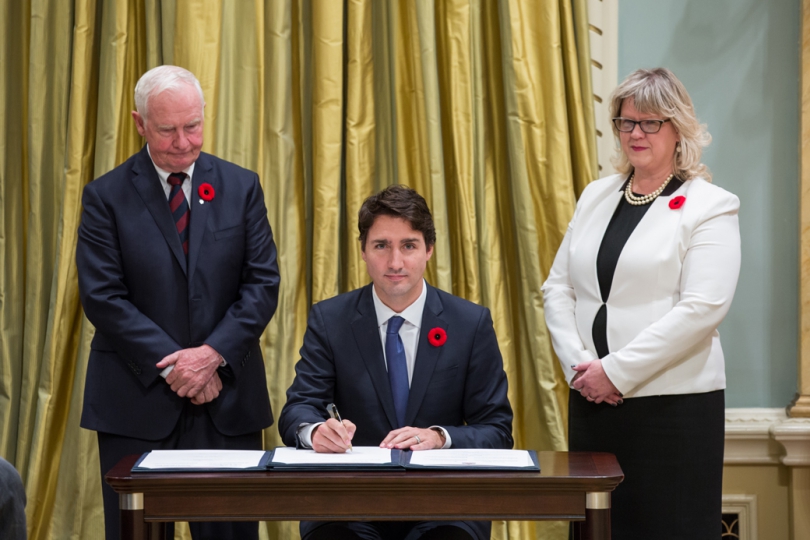Like this article? rabble is reader-supported journalism. Chip in to keep stories like these coming.
The wife of a former U.S. president will, in all likelihood, be the Democratic nominee for the U.S. presidency.
The eldest son of a long-serving Canadian prime minister is the current PM.
The daughter of a revered Alberta NDP leader is the current (and first) NDP premier of that province.
The son of a highly esteemed Prince Edward Island premier served two terms of his own as premier of that province, before retiring last year.
The son of a long-serving Progressive Conservative MP and cabinet minister is a leading candidate to take over leadership of the current federal (no longer Progressive) Conservative Party.
And then there are at least three political scions who are touted as potential new leaders for the federal New Democrats.
One is the grandson of a federal and son of an Ontario party leader. Another is the son of a highly respected former NDP parliamentarian and brother of a former federal party president. And yet another is the daughter of a long-serving and well-entrenched NDP member of the Manitoba legislature.
Funny thing, all that.
Ours is time when merit, talent, and hard work alone are supposed to be the only pre-conditions to success. The prevailing myth — in the West, at any rate — is that inherited position and status no longer determine who gets ahead and who stays behind.
Like so many myths, of course, it is, in reality, just another fairy tale — not true. Money and social connections continue to pave the way to professional success, here in North America, as elsewhere around the globe.
Senior officials sometimes pull strings to favour those with family connections
Even in notionally meritocratic Ottawa, one can hear tales of senior bureaucrats finding positions of one sort or the other for their own offspring or the offspring of friends and colleagues.
That sort of favouritism is not supposed to happen. Access to careers in the federal public service is notionally based entirely on merit, with, at times, provision for affirmative action. But favouritism for those with family and social connections does happen, all the time, in all kinds of subtle and not-so-subtle ways.
When it comes to the private sector — well, there is no pretence of fairness, openness and the merit principle there. Who you are, who your father is, and who you know are all, far too often, much more important than what you know and what you can do.
And in the world of electoral politics, it seems we still have a great affinity for dynasties, long after the age of absolute monarchs was supposed to be over.
On the Indian sub-continent one’s caste traditionally defined one’s occupation and set limits on one’s professional aspirations.
Mind you, in India, inherited status is not always, on its own, sufficient to guarantee success. The latest descendant of the long-ruling Nehru family was no match, in the last Indian election, for a son of tea-sellers and grocers, and member of what the Indian constitution defines as one of the “Other Backward Castes.”
Narendra Modi overcame his social disadvantages by harnessing a powerful current of Hindu nationalism and resentment toward the other and riding it to the prime minister’s office.
Still, as often as not, on the sub-continent, and here in North America, family connections, whether of birth or marriage, can make all the difference in politics.
Annointing a future leader because of his genes, not his accomplishments
It is hard to imagine that, in 2012, a young, enthusiastic and energetic, but relatively inexperienced and obscure backbench MP for the Papineau riding in north central Montreal — let’s call him ‘Julien Tremblay’ — would have received even the slightest attention had he declared himself a candidate for leader of the Liberal party.
And yet, years before the current Prime Minister had shown the slightest public interest in the leader’s job, and when he was still a very new MP, long-serving Liberals were telling this writer that the real MP for Papineau, whose initials were, like those of our fictitious example, also J.T., would be the future leader of their party.
There was nothing to go on, at the time. No record of legislative or executive achievement; no memorable feats of rhetoric. There was nothing but the time-honoured dynastic principle.
There is no rule that those who get to the top by virtue of the dynastic principle will, of necessity, be bad leaders.
They might, in fact, do an excellent job.
Despite some all-too-well-documented missteps, so far, the current Canadian PM seems to have the knack for making the right move far more often than the wrong one.
And yet, those of us curmudgeons and contrarians who are turned off by celebrity politics of all kinds, who find all echoes of monarchy and aristocracy to be anathema — and who could not give the slightest damn how cute or charming public figures and their families might be — cannot be happy when we contemplate the spectacle of entitlement and inheritance that so much of our politics has become.
In earlier times, when that spectacle offended the sense of justice and fairness of too many, the result was revolution.
Like this article? rabble is reader-supported journalism. Chip in to keep stories like these coming.
Image: PMO by Adam Scotti




